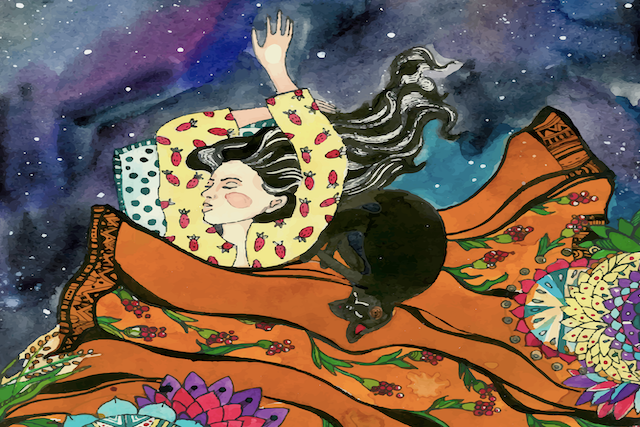
TRIGGER WARNING: This post references sexual assault and may be triggering to some people.
“Spirit carved by Nature
Here I am.
Slowly ascending
toward my own profundity.”
~Elicura Chihuailaf
That exhaustion you feel when your body is fighting something, the feeling of being completely drained to the point where you can barely move your body…. that’s how I felt when I was living with trauma.
Over the years it had piled up inside of me—the sexual assault I survived one night after I’d just turned twenty, the physical and emotional abuse that went on almost daily when I lived with my ex-husband… all of it was still living inside of me. And every day it was making me feel more and more tired.
The difference is, when we come down with, let’s say, a cold, once we fight it and heal, our energy returns, and we feel like ourselves again. But trauma… again, it’s different. At least in this culture; more on that in a little bit.
That’s why I never “got over” it. I never got my energy back; I never woke up feeling rested or like I was back to being myself. Not until eight years later.
Too Tired to Listen
From a very young age, our people are taught the importance of listening… especially to energy. We recognize that energy is in everything that’s alive, from the forest to a rock, the water, the sun, all animals, and, of course, ourselves. And energy will always “speak” to let us know when something is out of balance.
It’s hard to listen in this culture, though, even as an Indigenous person who comes from these teachings, and even though I’m only the first generation in my family to live in Western society. It’s hard because here we are distracted and so tired of just trying to survive.
Whatever energy we have has to go to work so that we can pay our bills, rent, food, and whatever else is needed. We don’t have the support of our communities, where everyone helps each other out, growing food, caring for those who are sick or injured, and even raising children. At least that’s how it was in my community, on our reservation, before so many of us were forced to leave.
It takes a lot of energy to do everything alone, as most of us do in this culture. That’s why so many of us don’t see any other option but to push through, and as a result, we forget to listen.
Back then, if I’d listened instead of feeling guilt and shame for not doing enough, I would’ve understood myself better. I would’ve shown myself more compassion and known that my energy was telling me something was off.
The fact that I could barely get out of bed and jumped at any chance to doze off: in parking lots in my car, at work behind some boxes in the stockroom, in bed while watching Friends. It wasn’t laziness or a lack of motivation. It was me, still trying to survive what I’d been through.
Not Living, Busy Surviving
While we don’t always think of the stress we go through or even the trauma that happened in our past as something that would be considered surviving—and if we do think of it as surviving, it’s usually past tense—it is how our energy and body respond.
And what’s important to remember about energy and ourselves as nature is that we don’t have an endless amount of it. We’re not like our laptops or phones, with a charger that you can just plug in and recharge. That means when your energy is focused on surviving, it doesn’t have enough left to take care of you.
Going back to the comparison of having a cold. When you go to sleep, your body doesn’t just stop fighting the virus, right? It continues while you sleep, which is why you wake up feeling exhausted.
Stress and trauma work the same way. Just because you’re lying down, resting on your couch, or going to sleep, that doesn’t mean your body (and energy) stops protecting you.
Think of a deer trying to escape a hunter. At that moment, their energy can only focus on survival, right? It’s not until they get away and find safety that their energy changes back to its natural state, balance, because then they don’t need to try to survive anymore.
But let’s say this deer is living in a place that is not their natural environment. Instead of open meadows and deep forests, there’s a high chain-link fence trapping the deer with the hunter. The deer runs and desperately tries to find a way out, a place to be safe, but can’t find it.
Eventually, the deer will become tired and lie down because, like us, the deer can’t fight for survival forever.
My life back then was not focused on living. It was almost exclusively focused on sleep and coming up with excuses so that I wouldn’t have to leave my bed. And to no surprise, my friends eventually got fed up with me always turning them down, so they stopped calling. While I was relieved to not have to come up with excuses anymore, I felt lonelier than ever.
That’s the strange thing about survival, or it’s not strange; it makes a lot of sense. When we’re in this state, we don’t want to be alone, but at the same time, we’re also too tired to be around people. Or to pick up the phone or answer calls or texts from loved ones. We want to, but there’s not enough inside of us to make us do it.
So we hide behind the walls we build to protect ourselves, while at the same time, wishing for a way out.
It was only meant to be temporary.
It was never meant to be this way. Survival is meant to be temporary, to protect you, to help you through something, to keep you alive. That’s why you were born with responses to finish it. That’s why you were born with the ability to heal, just as you heal from any other wound or when you’re sick.
It’s the laws of nature, or else life could never continue.
And like the deer, when your nge, your energy, knows you’re safe, it changes the message it sends to your body: from doing everything to protect you to taking care of you.
What keeps us stuck in survival, too drained and exhausted to live our lives, is living in a culture that keeps trying to convince us that we’re not nature and that these responses we have had to be controlled, even stopped.
Think about the responses you have that would make you embarrassed if they happened around other people, or would make you think of yourself as “weak” but are completely natural. Crying, trembling, shaking.
Here we learn to look at ourselves as humans without human responses, and it has consequences.
Too many people are now living too exhausted to engage with life because they can’t finish survival. They don’t know about the gifts nature gave them to heal from trauma and release stress from their bodies. That what comes in must come out, and what starts must finish.
The arrogance of this dominant culture is thinking they can do better than, and even replace, nature. And the danger of a homogeneous societal culture is that it makes us believe it too.
Conclusion
Remember that no matter how strong and resilient you are, your energy can only do so much at a time.
When you go to sleep, that’s when nothing else is going on and your body can focus on taking care of you. But if it still has to survive what you went through in your past, it can’t do that. No amount of bubble baths, journaling, Tempur-Pedic pillows, medications, or talking it over with logic will change the fact that survival has to end.
It wasn’t until I healed from trauma (a reality that unfortunately causes a lot of suspicion in this culture) that I finally started feeling rested.
And that’s the bottom line—no matter how much you sleep, your body can’t truly rest until it feels you’re safe.
Just like the land we walk on and the water that gives us life, our bodies come with powerful abilities that, today, only ancestral Indigenous wisdom can help us remember and return to. Not just for a good night’s sleep but for all the things we miss when we’re too tired to live our lives.
We just need to listen.
About Mandy Martini
Mandy Martini—Kvyen Chihuailaf (Moon, Mist-Spreading-Over-A-Lake)—is a Mapuche writer and teacher of kuyfi kimün, Indigenous knowledge that has been passed down from generation to generation. She's the creator of SLG, an online school where she's taught people in over thirty-five countries how to heal from the effects of stress and trauma. Want to learn more? She offers free classes and resources on her website, www.return2life.co.













 Though I run this site, it is not mine. It's ours. It's not about me. It's about us. Your stories and your wisdom are just as meaningful as mine.
Though I run this site, it is not mine. It's ours. It's not about me. It's about us. Your stories and your wisdom are just as meaningful as mine. 